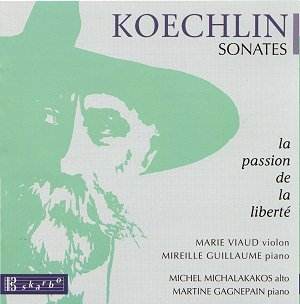CHARLES KOECHLIN
(1867-1950)
Violin Sonata (1916) 32.22
Viola Sonata (1913-15)
32.08
 Marie Viaud (violin)/Mireille
Guillaume (piano)
Marie Viaud (violin)/Mireille
Guillaume (piano)
Michel Michalakakos (viola)/Martine Gagnepain
(piano)
 rec 1997 SKARBO SK 1985
[64.28]
rec 1997 SKARBO SK 1985
[64.28]
www.netbeat.com/skarbo

Koechlin wrote a great number of works. Bewilderment at this outpouring has
prompted a few musicologists to dismiss the works as uneven (highly likely
in a large output - think of Mozart) or dull. Certainly he had no easy successes.
not for him a Honegger Pacifc 231 or a Mossolov Iron Foundry. The
BBC, about five years ago, broadcast a major survey of his music revealing
him as an enigmatic composer worthy of further exploration. This, in itself,
is a major step given the plethora of works to sift and appraise.
Between 1916 and 1917, in the depths of a bloody war taking a massive toll
on Europe's young lives, three violin sonatas arose from France: Faure's,
Debussy's and Koechlin's. The Koechlin is ecstatic and rhapsodic - a counterpart
to the Delius violin and cello sonatas and the Delius violin concerto. Cascading
notes resolve in the second movement into a determined statement and a contented
sunset of a theme. A short and equally contented adagio divides us from the
long (13.30) finale. A grave patterned theme takes us forward rising to a
statement of lofty lyrical eminence. This work can profitably be considered
alongside the Howells violin sonatas of that decade, Ireland's second and
Dunhill's second. It is dedicated to his teacher, Faure.
The inwardly orientated Viola Sonata begins in an atmosphere of understated
peace with a hint of disquiet. Koechlin confessed to writing music of an
escapist leaning in the violin sonata. The viola sonata looks the war in
the eye for as long as the composer can bear it. If there is any escape in
this sonata it is imperfect. There are troubled rustlings and currents here.
Harmonically speaking this is far more oblique than the violin sonata. The
scherzo is a Goblin hunt paralleling the grown-up fairytale world of the
Prokofiev Violin Concerto No. 1, not to mention a work later published in
France, the John Foulds cello sonata. The andante is a cold or at least cool
meditation. Once again the finale is the longest movement at 12.40 (the violin
sonata's is 13.30) and is of uncertain mood but certainly not optimistic
or joyous. This music is reflective with a heightened consciousness of tragedy
and the washing away of old certainties. It will appeal to those who enjoy
the Bax Viola Sonata and the darker side of Frank Bridge. The work was completed
during Koechlin's time as a war hospital attendant.
The disc is neatly documented and well presented. The performances strike
me as excellent although I confess that I do not know alternative performances.
Reviewer
Rob Barnett

